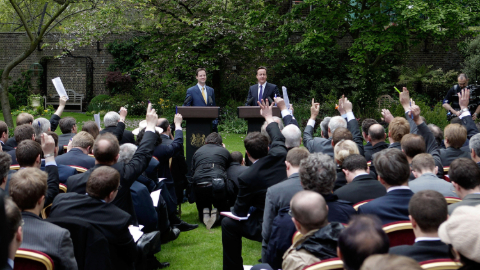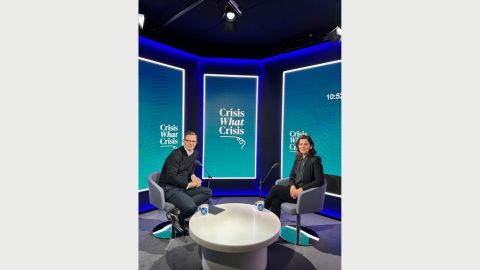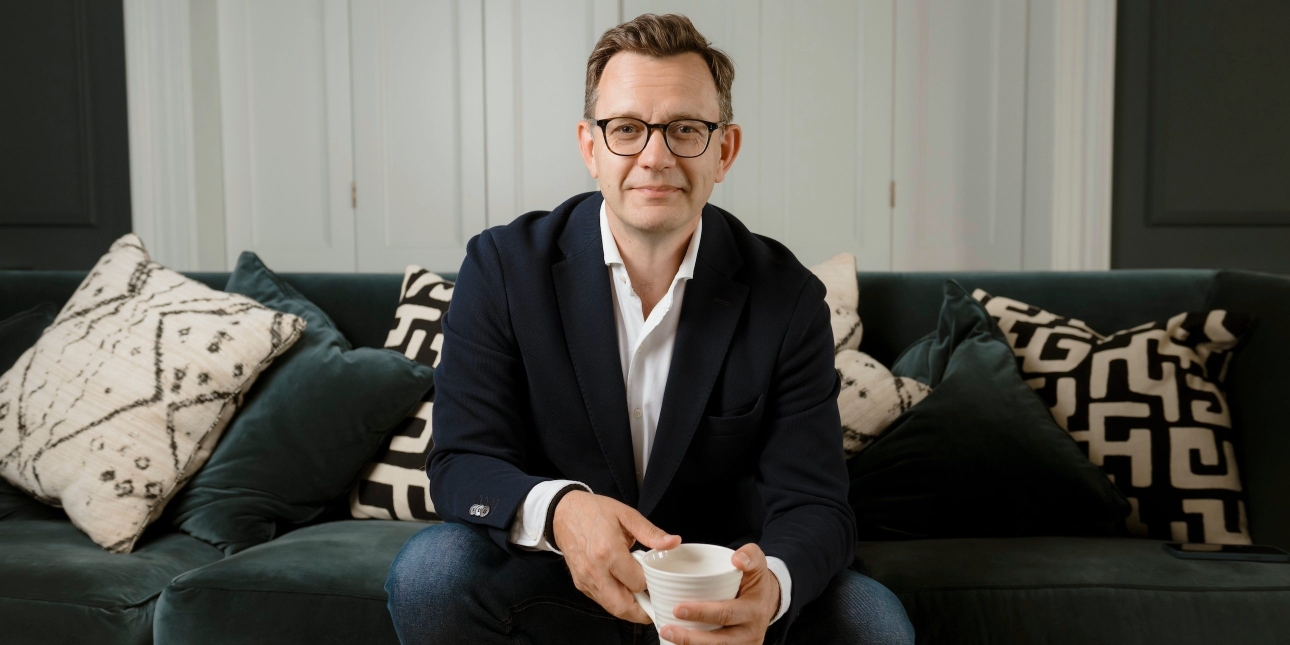Andy Coulson: 'I enjoy doing crisis comms work because I lived it.'
The former tabloid editor and No 10 comms director now runs an agency specialising in reputation and crisis management. Here he talks about Trump’s ‘Weave’, Belmarsh and why Starmer should cheer up.
Born in Essex in 1968, Andy Coulson left school at the age of 18 to work on local newspaper, the Basildon Echo. Within two years he’d joined The Sun to work on their showbiz column, Bizarre, which he later edited during the mid-1990s.
Progressing through the ranks at Rupert Murdoch’s News International, Coulson was editor of the News of the World from 2003 to 2007. He then left journalism to join David Cameron’s Conservative party as director of communications, a role he continued at No 10 when Cameron was elected prime minister in 2010.
In 2014, Coulson went to prison, receiving an 18-month sentence after being found guilty of phone hacking offences. Upon his release, he founded Coulson Partners, a PR agency which provides strategic advice, plus reputation and crisis management for high-profile leaders.
Never sit in your echo chamber. Every Sunday my grandfather would read the News of the World and the Sunday Mirror. He’d read both the Conservative and Labour press to make up his own mind. It’s something that’s always stuck with me.
Doing work experience at the Basildon Echo as a 16-year-old was like being in Disneyland. The typewriters, the excitement of the newsroom, seeing my by-line in print – I just fell in love with it all.
I was Bizarre editor during the Spice Girls era. It was fascinating to see them being created as a commercial entity, attracting sponsors such as Pepsi who wrapped themselves around the band.
It was the Spice Girls who made me realise I should stop doing showbiz. I was on an early date with Eloise (now my wife) and had to leave early to attend one of their concerts. Not a good look!
Working for The Sun was more meritocratic than many think. I’m a not-particularly-well-educated lad from Essex, but nobody ever stopped me in the corridor and asked where I went to school.
My role as David Cameron’s comms director was to be an objective voice in the room: a bloke who sticks his hand up and says, ‘Are you sure?’
We couldn’t have organised the Rose Garden press conference better [2010 press conference in the Downing Street garden where David Cameron and Nick Clegg met the press following their coalition announcement]. Cameron and Clegg had brilliant interplay, finishing off each other’s sentences.
When the press conference was finished, the Lib Dem and Tory teams went into opposite corners of the garden and started briefing against each other! I had to tell them, ‘Yes, there’ll be times when you can bang your own drum, such as conference but this [not supporting each other] isn’t right’.

The image of David Cameron as PR man [he was former head of comms at Carlton TV] is slightly overplayed. Cameron had good instincts on media, but his chancellor George Osborne had great ones. He always understood what the story was, later becoming Evening Standard editor.
I was persona non grata for five years [spanning the Leveson Inquiry and his time in prison]. Things started going backwards: all the foundations in my life crumbled quickly.
I didn’t manage the first year [of Leveson] well at all. I was struggling. Everything was unravelling.
Going to prison is like having an audit on your life and friends. As the cliché goes, you know who your friends are. Luckily, far more people who owed me nothing ran towards the problem, rather than those running away…
I spent my time at HMP Belmarsh watching more Homes under the Hammer than is healthy. Later, when I moved to Hollesley Bay Prison, I was put to work: helping prepare prisoners for release, doing Dragon’s Den-style presentations and writing their CVs.
An epiphany came when I was arrested for the second time [in 2012]. I remember sitting in a Glasgow prison cell and realising, ‘I’ve got no control over what will happen in the next year. But I can control how I will react to it and behave as a result’. It really helped pull me together.
I’ll always take opportunities to apologise for what happened at the News of the World… but what I won’t apologise for is getting on with my life and making the most of what’s left.
I didn’t want to hide when I left prison. It’s why my business is called Coulson Partners, rather than named after a London square or something abstract.
I founded Coulson Partners because I felt I could be useful to people. I had an offer to write a book – and needed the money. However I thought people going through difficulties need people who’ve been there to give advice.
When you find yourself, as I do, with clients, in a position of trust, you know, that is a wonderful place to be. I enjoy having those one to one conversations that are all about trust and trying to help people find their purpose.
Being a business leader has never been lonelier or more polarising. You’re either a genius or an idiot. It’s our job as advisers to create a safe space and help them navigate towards finding their truth and purpose, and then work in smart and clever ways to help them.
Reputation management is much misunderstood, often ending up being [considered as] spin or ‘dark arts’. People often see it as being manipulative in some way. But who doesn’t want to have a good reputation? It’s a positive endeavour and makes commercial sense. Sadly, conversations around reputation management often arrive too late because it’s not central to the business in the way it should be.
I enjoy doing crisis comms work because I lived it. And what I offer, of course, is that there is no agenda. You’ve got to have people around you who have no skin in the game.
My approach to most situations that have got some difficulty attached to them, is to lower the temperature. That allows you then to find some space, to make some proper decisions. It's also why I started my podcast Crisis What Crisis.

Donald Trump is a genius at ensuring the conversation is the one he wants. We often wonder why this bloke is meandering off-script, but as he explained in Joe Rogan’s podcast last year, it’s part of his ‘Weave’ technique: dropping little crumbs in the road that lead to one inevitable conclusion.
Trump’s ‘Weave’ could change how politicians communicate. It could also open the door to more business people entering politics.
My advice for Keir Starmer? Cheer up. Being a prime minister is tough and demanding; it’s difficult on your family. But you need to find some enjoyment in the job and demonstrate to others that you love it too. That’s infectious, right?
Having said that, I’m probably the last person to offer a view on Mr Starmer, especially given his previous legal career.
Find out more about Coulson Partners.
Find out more about the Crisis What Crisis podcast

Lysanne Currie is the editor of Influence. She previously edited Director magazine for the Institute of Directors and Sky magazine for British Sky Broadcasting. Lysanne is the founder and CEO of content agency Meet the Leader.
Crisis communication training
The CIPR's crisis communication on-demand series provides an overview of the different elements when dealing with a crisis through to recovery. The series will give you a better understanding of issues turning into crisis, how to create a crisis communications plan, how to respond to a crisis in an effective manner and more.
.jpg&w=728&h=90&maxW=&maxH=&zc=1)
